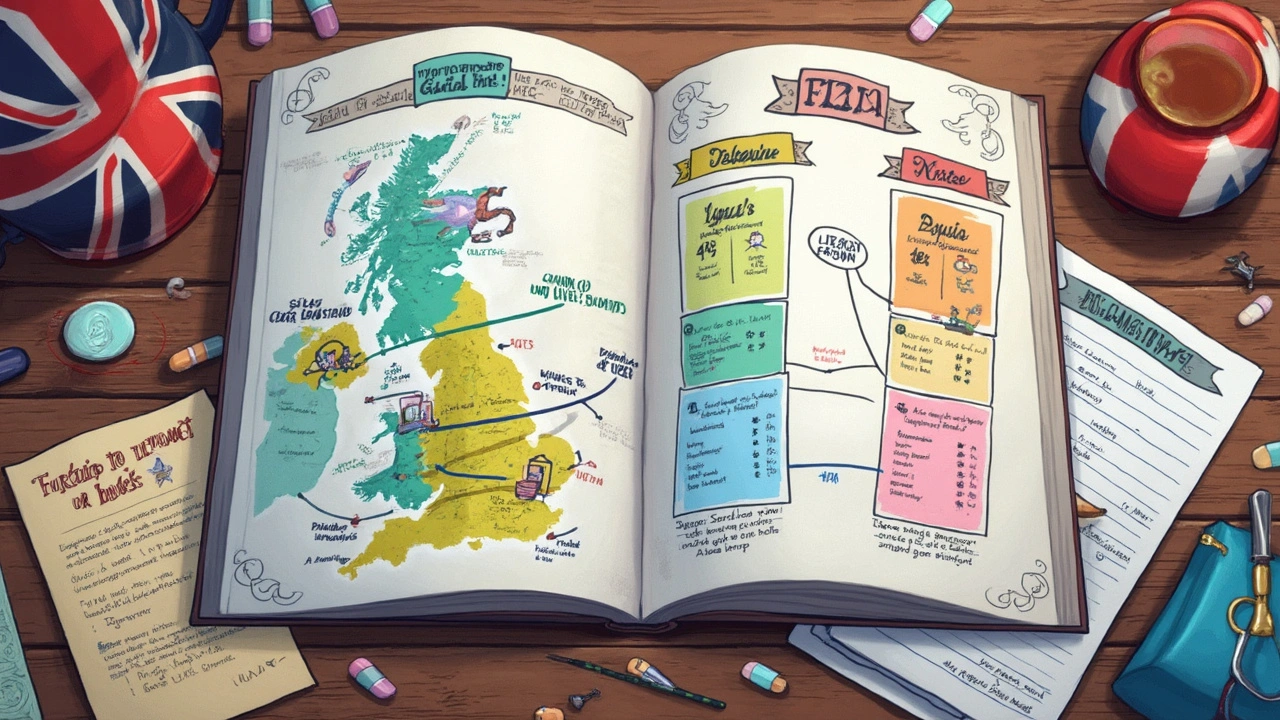The Wild West of Cross-Border Drug Purchasing
Right now, thousands of Aussies scan online pharmacies with one question: “Can I really buy meds from overseas without drama?” It’s tempting, especially since prices for prescription drugs can be brutal down under, and medical tourism has become a buzzword even at backyard barbies. But let's not sugarcoat things—the world of cross-border drug shopping is tangled. Customs regulations, FDA red tape, strict Australian laws, and a mishmash of interpretations are what actually greet you at your front door, not just the mailman with a package of pills. If you’re picturing shady deals in some alley, hit pause; most folks just want relief from eczema or cholesterol, not a crime spree. But those official rules aren't keeping up with the click-and-collect age.
The first thing that pops up? So many of these overseas sites promise 'worldwide shipping' and 'no prescription needed.' That sounds dodgy for a reason—because crossing borders with medication, whether tucked in your suitcase or shipped to your address, isn’t just about snagging a bargain. Australian Border Force and their mates in customs across the world are trained to spot suspicious items, especially pharmaceuticals. Even if your motives are pure, that doesn’t get you off the hook. There are heaps of stories about packages stopped at customs, sometimes destroyed, sometimes flagged for follow-up. New data shows that in 2024, Australian customs seized more than 185,000 shipments of prescription medications suspected of breaching local laws—a spike driven by pandemic-era supply strains and rising prices.
Why the crackdown? For starters, governments want to stem the flood of counterfeit or substandard meds. Even if you trust the source, local law usually takes precedence. You’re also contending with biosecurity rules, import permits, and the often-overlooked fact that some meds legal overseas are banned here altogether. Just ask anyone who tried bringing codeine-based cough medicine back from a vacation in Bali—a tee-up for airport trouble if you’re caught unaware. The system’s not always logical. Some drugs require a prescription here but are over-the-counter in Thailand or India. That loophole doesn’t make it legal once you hit Australian customs. So next time a mate brags about cheap antihistamines online, remember: customs sees things through a hotter lens than your internet browser.
What Customs and Border Control Actually Look For
Ever get that sinking feeling at the airport when the customs officer glances a bit too long at your luggage? Reality check: customs systems are built to block more than just fruit or dodgy souvenirs. Every year, millions of parcels zip across borders, and prescription medication is one of the most watched categories. When you import drugs—even for personal use—customs officers aren’t just looking for illegal party pills. They're trained to spot even everyday prescription meds if they're coming in from overseas, especially if the labeling isn’t clear or if the quantities raise eyebrows. If you order a lifetime supply of antibiotics, don’t be surprised if you end up having a long chat with authorities rather than a quiet night at home getting well.
The Australian Border Force uses high-tech scanners, sniffing dogs, sophisticated data sharing, and old-fashioned manual checks. Shipments from known 'exporter countries' are frequently flagged for inspection—India, Thailand, Turkey, and even some European hubs. Customs rules say you can import up to three months’ supply of a medication for personal use, provided you have a prescription written by a registered Australian prescriber, and the medicine is not a controlled substance under the Customs (Prohibited Imports) Regulations. If you skip those steps, or if you try to slip through more than the allowed amount, you might be accused of illegal importation—even if your only crime was saving a few bucks.
Ever wondered what happens when your package gets intercepted? Sometimes, they’ll send you a letter saying it was destroyed. In more serious cases, you get called in for an interview, or even face legal action. If they suspect intent to distribute or risks to community safety (think: opioid or pseudoephedrine), things can escalate. You could lose your shipment and cop a fine. For chronic health issues like diabetes, travelling Aussies often have horror stories about their meds being retained at international customs, especially if they can’t produce a translation or the doctor’s note is vaguely worded. The bottom line? Your best-laid backup plan for cheap meds can crumble at the arrivals hall faster than you can say 'quarantine bin.'

The FDA’s Personal-Importation Guidelines: Decoding the Myth
While Aussies need to keep their eyes on local law, the U.S. FDA’s personal-importation policy often pops up in online pharmacy circles. Why? It’s one of the few frameworks that gives a (slightly) clearer roadmap for personal cross-border drug importation. But don’t mistake clarity for freedom. Under this rule, the FDA says it “generally does not object” to importing a three-month supply of certain medications for personal use, but only if strict conditions are met. The key one: the drug must not be approved for sale within the U.S. (or local regulation), and you can’t be making a business of it.
People often misread this as an open invitation to import whatever they want. Not so fast. Doctors and patients alike sometimes play a cat-and-mouse game with the rules. If the medication is life-saving, not available locally, and isn’t for resale, the FDA is more likely to allow it. You also need a written letter explaining your condition, your doctor’s contact information, and evidence that the medicine is for your own use. Even with all this, the FDA can and does confiscate shipments. In 2024, the U.S. FDA reported stopping 37,000 parcels carrying prescription meds, and roughly half never made it to the buyer. The point? Being honest about your condition helps, but official discretion is huge. Even a compliant package can end up in the bin if the border officer has questions.
Another twist: many people think buying online through overseas pharmacies is covered if they follow FDA or Australian guidelines. Specific online pharmacies, especially those flagged by authorities, rarely meet the full checklist for legitimacy. There are lists of trustworthy providers, but they change all the time—meaning what’s legal today could get flagged tomorrow. If you’re feeling out of your depth, don’t rely on the first Google result. Check through pharmacy accreditation agencies or look for a recommended RXConnected alternative that scores well for transparency and compliance. Even still, don’t expect a 100% guarantee your parcel will clear customs. Personal importation, in legal eyes, is still a high-wire act—sometimes you get across, but the risk never drops to zero.
What Counts as Personal Use vs. Commercial Import?
This bit is where most get confused. On the surface, “personal use” sounds like common sense: you’re buying medication for yourself, not to sell to mates or strangers. But law loves grey areas more than clarity—it’s not just about your intentions, but how customs or the TGA (Therapeutic Goods Administration) reads the facts. If you import more than a 3-month supply, request odd combinations of drugs, or the order looks like it’s meant for a group, expect to be flagged. The packaging and labeling matter. If it’s not in original packs or contains leaflets in languages customs can’t read, your otherwise-innocent shipment can get pulled fast.
Repeated orders from the same address, suspicious payment methods, or returns to sender often trigger red flags. People get creative to dodge barriers—splitting orders across several addresses, or using friends to carry boxes home. Sometimes it works. Sometimes it goes pear-shaped, and you cop a suspicious import investigation—especially if the authorities decide you’re crossing the line from personal bulk orders into potential reselling. The risk jumps if you’re dealing with restricted substances or high-value meds often linked to misuse. And to be clear, 'prescription required' isn’t just words on a website. Customs has a way to check if your attached script matches up, and fake ones rarely fool them now, thanks to global data sharing between pharmacy regulators. A real lesson from late 2024: dozens of buyers found out the hard way when their fake scripts were flagged and shared across customs systems between Australia, Singapore, and the U.K.
So, what do you do if you absolutely need to import a medicine not stocked locally? Get all your paperwork in order—Australian prescription, detailed medical rationale, doctor’s contact details ready to hand over. Budget for the realistic chance your shipment could be stopped. And never, ever try to hide meds in a package disguised as something else (old school trick, but customs knows it too well by now). Transparency helps; secrecy almost never does. People who can present everything neatly, honestly, get a much better shot at clearing customs, even if there’s still no guarantee.

Smart Alternatives: Navigating Online Pharmacies and Avoiding Legal Minefields
The world’s only getting smaller, but legal risks when buying meds abroad seem to be getting bigger. So, how do you actually get what you need without crossing the line? One practical step is to use only established, transparent online pharmacies. Look for accreditation from organizations like the Australian Pharmacy Guild or, for overseas options, the Canadian International Pharmacy Association. Some international pharmacies now display a ‘verified’ badge from regulators or trusted third-party evaluators—use this as a bare minimum filter. But always cross-check on official government lists, since scammers love to fake trust logos. Never overlook whether they ask for a real prescription. If a website lets you check out without one, that’s usually a bright red flag.
Another overlooked tip: opt for trackable shipping. This gives you both a sense of your parcel’s journey and evidence for authorities if you ever need to follow up. Avoid bulk buys or multiple products in one go. Space out purchases and, for higher-value medications, ask your doctor to write a customs-friendly note explaining why the prescription is essential. Double-check that the meds themselves aren’t forbidden locally—a surprising number of substances legal in North America or Asia are outright banned in Australia due to different standards. For rare meds, see if there’s an Australian-registered 'special access scheme' before importing. That can sidestep headaches at the border.
Stay sharp on privacy, too. Many overseas pharmacies collect way more personal info than Aussie standards require. Use a VPN or privacy-focused browser if you’re comparing prices abroad. And for the latest in 2025, always check curated comparison outlets—like the recent top-shelf list featuring each major RXConnected alternative—to ensure you’re not walking straight into a legal or identity-theft mess. The world of online drugs is crowded, but a bit of savvy shopping—and understanding the fine print—can make all the difference between a smooth delivery and a letter from customs you really don’t want.


Chris Faber
May 4, 2025 AT 17:11Mate, the whole cross‑border thing is a nightmare but also kinda tempting. I get why folks hunt for cheaper meds, especially with the Aussie price tags. Just remember customs can be a real pain and you might end up with a letter instead of pills. Keep your paperwork tidy and you’ll have better odds.
aura green
May 13, 2025 AT 23:24Oh sure, because nothing says ‘wise decision’ like ordering prescription meds from a website that thinks a pharmacy licence is just a fancy badge, right? The whole personal‑import thing looks simple on a screen until you actually meet a customs officer who seems to have memorised the entire TGA handbook. I’ve seen people try to dodge the rules by splitting orders across three friends, only to get three letters saying “your parcels were destroyed” and a nice reminder that you’re now on a watch list. It’s almost adorable how some sellers promise “no prescription needed” as if the law cares about their marketing copy. Meanwhile, the FDA’s personal‑import guidelines are tossed around like a meme, but they still require a legit doctor letter and a clear “personal use” justification. If you think a three‑month supply is a loophole, think again – customs checks your quantity against what a typical Aussie would actually need. And yes, the very same scanners that detect fruit can also flag a bottle of antibiotics if the label isn’t in English. The irony is that the cheapest pills often come with the highest risk of counterfeit ingredients, which is a nightmare for anyone with a real health condition. So, before you hit “confirm order,” ask yourself whether a potential fine and a ruined reputation are worth a few dollars saved. A quick tip: always use a trackable shipping service and keep a copy of your prescription handy – it won’t guarantee passage, but it improves your chances. Some people even get a “personal import exemption” from the TGA, but that’s a formal process, not a casual checkbox on a checkout page. Honestly, the whole market feels like a Wild West where the sheriffs are customs agents and the outlaws are the shady online pharmacies. If you’re lucky, you’ll get your meds without a hitch; if you’re unlucky, you’ll be stuck with a legal letter that reads like a novel. So stay sharp, do the paperwork, and maybe consider legitimate telehealth options that operate within Australian regulations. Bottom line: the gamble isn’t free, and the odds are rarely in your favor 😊
Edward Morrow
May 23, 2025 AT 05:37Listen, mate, the whole 'I’m just buying my own pills' excuse is a load of bollocks when you’re pulling in bulk from overseas – it smells like a drug‑ring before customs even opens the box. The Aussie Border Force isn’t a bunch of do‑nothing wallflowers, they’ve got scanners that can sniff out a single tablet of codeine faster than you can say “cheaper meds”. If you think you can outsmart the system by using a fake script, you’ll end up with a criminal record that makes a scarier souvenir than any cheap headache cure. Stop feeding the market for shady pharmacies and stick to legit channels, or you’ll be the poster child for “how not to import medication”. Enough said.
Shayne Tremblay
June 1, 2025 AT 11:51Hey folks, remember that staying healthy doesn’t have to mean breaking the law – there are legit telehealth services that can get you the meds you need without the customs drama. If you’re feeling stuck, reach out to a local pharmacist who might know about the special access scheme for hard‑to‑find drugs. Small steps like keeping your prescriptions up to date can save a lot of hassle down the road. Keep your head up and your paperwork straight, and you’ll avoid the nightmare of a seized parcel.
Stephen Richter
June 10, 2025 AT 18:04Please be advised that repeated unauthorized imports constitute a breach of Australian customs regulations.
Musa Bwanali
June 20, 2025 AT 00:17Look, I get the warning, but you’ve got to understand that many Australians are driven to these imports because our system can’t keep up with demand; we need smarter solutions, not just scolding.
Allison Sprague
June 29, 2025 AT 06:31Frankly, your argument is riddled with logical fallacies and a staggering lack of precise terminology – “driven” should be “compelled,” and “scolding” is a poor choice when discussing regulatory compliance. Moreover, you gloss over the fact that illicit importation jeopardizes patient safety, a point you conveniently omit. While your passion is commendable, it would serve you better to back it with verifiable data rather than vague grievances. In short, put the facts first, then we can have a constructive discussion.